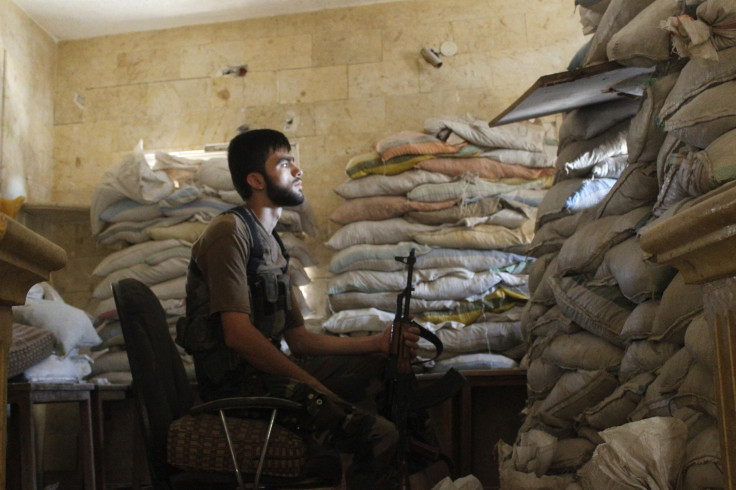ISIS Is Recruiting Child Soldiers, Committing War Crime, As It Gains Ground In Aleppo

Al-Bab, a city just north of Aleppo, Syria, and a short drive from the Turkish border, used to be a home base for rebels of the Free Syrian Army. Now, the town is a hotbed for Sunni militants fighting for the Islamic State, formerly known as ISIS, who are actively recruiting and training fighters, including children.
A new report published by the U.N. Human Rights Council said ISIS is “systematically provides weapons and training for children.” The group has established training camps across the country, but especially in Aleppo province and Raqqa in the east, to recruit children into armed roles, a war crime.
The U.N. report adds to the case for intervention in Syria as it accuses ISIS of committing war crimes and crimes against humanity. The Human Rights Council said the case should be referred to the International Criminal Court.
A training camp in Al-Bab recruits children ages 14 and 15, who receive the same training as adults, and offers financial rewards, according to the report. The training includes both weapons and religious education.
ISIS took over Al-Bab, once known for its textile production, in the fall of 2013, pushing out civilians who supported the moderate Free Syrian Army and Jabhat al-Nusra, an Islamist fighting group that is linked to al-Qaeda but less brutal than ISIS. Prior to taking the city, opposition rebels, though they fought with different factions, had established a kind of governing structure. The opposition defeated the Assad regime troops in an intense battle in July 2012, and soon after began sending soldiers to secure banks, hospitals and schools.
It is unclear how ISIS took over the city, whether it was in one battle or several, but opposition activists from the city said the rebels who fought for the FSA and al-Nusra were either executed or forced to flee to the Turkish border. Many of those who fled are no longer fighting, which has decreased the moderate opposition’s manpower and ability to fight off ISIS and the Assad regime.
Al-Bab is just one of several cities in Aleppo province that have been seized by ISIS. The militant group is currently trying to gain ground in the north of the country in an attempt to take Aleppo itself, Syria's economic capital. ISIS claimed that it was attacking the opposition-held areas in “revenge for our chaste women,” claiming FSA and al-Nusra soldiers had raped and abused their wives after a battle in January.
In retaliation, rebels fighting under the umbrella of the FSA and al-Nusra announced a new operation Sunday, dubbed "Nahrwan al-Sham," to drive out ISIS from the area. The announcement comes as the U.S. debates whether to conduct airstrikes against ISIS in Syria as it did in Iraq.
The U.S. has been arming vetted groups in the opposition since last summer, but the opposition has asked the Obama administration for more support. The U.S. is currently supplying the opposition with anti-tank weapons and ammunition, and is training a few hundred soldiers in Jordan, but it has yet to send anti-aircraft weaponry.
Senior U.S. officials have said the administration would not send those weapons because they could end up in the hands of ISIS. But without them, leaders of the FSA have said they simply cannot fight the militant group, which is purportedly generating about $2 million a day.
The U.S. began reacting to the ISIS advance in Syria and Iraq when the militant group moved closer to taking Erbil in Iraqi Kurdistan, where American diplomats are stationed. It conducted air strikes against ISIS targets in Iraq, apparently at the request of the Iraqi government. The U.S. said then that it was conducting airstrikes for two reasons: to protect American diplomats in the country and to prevent the potential genocide of the Yazidi people in the Sinjar Mountains.
Analysts have said that the U.S. conducting surveillance flights over Syria could indicate that it is preparing to begin airstrikes.
The U.N. Security Council passed a resolution Aug. 15 that placed six individuals affiliated with ISIS and Al-Nusra on its al-Qaeda sanctions list, and threatened to take action against those who financed them.
© Copyright IBTimes 2024. All rights reserved.





















